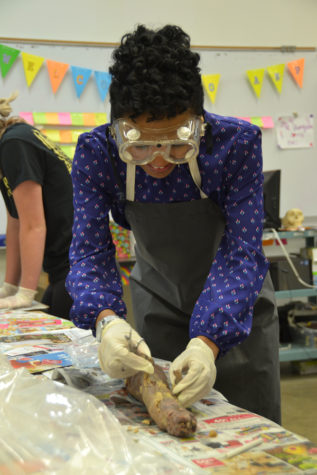Audience Behavior At Spring Play Displays Disrespect For Art
April 13, 2017

Last month the drama department performed You Can’t Beat the House, a play about two robbers who break into a house only to find that that is for sale and haunted. The plot grows from there, including both humorous and surprising aspects.
The play was performed during first block and all classes were allowed to attend. Numerous teachers accompanied their classes to the play, filling the auditorium. One would expect the audience to be enthralled by the play as it was well executed and the actors seemed enthusiastic about their roles. The audience as a whole, however, was not captivated by the performance and was instead very disrespectful. Around half of the audience not only talked the entire time, but also threw items at the actors as they were performing and booed them once the play had ended.
“It was definitely rude, but those of us who’ve been performing for Central for years have learned to ignore it and not let it get to us. Some of the younger actors, though, were pretty shaken up by it- when that’s your first experience it can be discouraging,” senior Hannah Cozart said.
Sitting in the audience, I was baffled by the disrespect for the actors and the disregard for the amount of hard work and time the actors had put into perfecting the play. The actions of the audience reminded me of when I was in middle school; they were acting like disrespectful, immature middle schoolers with little self control versus matured high schoolers.
“Overall, we did the best performance we could, and we’re proud of our work whether the audience could appreciate it or not,” Hannah said.
I agree with Hannah in that I feel that the actors were well versed and did a wonderful job. The parts of the play that I was able to hear were well-developed and often witty and funny.
Not all of the audience was disrespectful, some people seemed to be really trying be engaged and watch the play. However, the disrespectful members of the audience were distracting- not only for the actors but for other people within the audience as well.
Once the play had ended numerous members of the audience began booing. The play director Michael Scott came out not long after and addressed the issue in what I thought was a very effective way. Instead of being stern, he called them out in a much more passive-aggressive, almost funny way, saying, “Hey! All you booers, you don’t have to watch! You can just close your eyes!” One of the booers within the audience decided to talk back and to him Scott said, “You got a performance you want to do? Come on down and I’ll do a duet with you! You know where to find me.”
I agree with Scott. There is no reason to boo during a play. It is disrespectful and rude. As a student you should be glad that your teacher was nice enough to allow you to get out of class and see the play. If you don’t like it, take a nap.
““The fact of the matter is that there isn’t a single play on earth that would satisfy a fantastically diverse captive audience of 1,000 high-schoolers. I’d say the actors were surprised by the level of disrespect, but we never have expected a silent audience for the school shows. We agreed that doing the play for the school is like doing the play on ‘hard mode’ because it is a weirdly hostile environment due to our less-respectful students,” Scott said.
Though I believe that the audience was unnecessarily disrespectful towards the actors, I do, in a sense, see where they are coming from. The sound system in the auditorium is old and often faulty. Even the people closest to the stage struggled with hearing the actors. From my seat, roughly 15 rows back, I had to strain to hear and at times was unable to hear at all meaning that I missed entire sections of the play that could have been very entertaining. So, regardless of how well the actors performed, it is understandable that the audience would lose focus.
In reality, many members of the audience probably did not care about actually watching the play and decided to come to the play solely to be able to get out of doing class work. Therefore, when unable to hear the actors unless they applied an extra amount of effort, many audience members lost interest before the actors had a chance to prove themselves and capture the audience’s attention.
The problem is, even if the amount of people who gave up trying to hear was relatively small, their talking made it more difficult for others around them to hear, inducing even more people to get distracted and begin talking, and the trend just continued.
Luckily, numerous parents have pitched in for new equipment so that the auditorium sound system can be revamped within the next couple months.
The faulty sound system, however, is still not an excuse for the audience to be disrespectful. Teachers should have attempted to get their students under control and students should have realized they were being disrespectful and chosen to take a nap instead if they did not want to watch the play.
“We will be assessing the procedure for showing the play to the school. Hopefully, we can work out a solution that really works for the people who actually want to see the play, so that they can enjoy it without having to worry about the nonsense from audience members who would rather put on their own show at our expense, so to speak,” Scott said.
Obviously, a new sound system is needed. Other adjustments should be made as well, however. If a teacher knows that their students may be disrespectful or restless during the play, they should not bring them. A smaller, more attentive audience is preferable to a larger yet less attentive audience. When in the auditorium, teachers and administrators should call students out for being rude and disrespectful much more often than what occurred during the most recent play. If a student is being rude, they should be addressed directly or they will more than likely ignore the requests to be quiet and attentive. Hopefully the new sound system will solve the majority of the problem. However, if it fails to, it is up to both the teachers and the students to change the attitude of the audience, as the actors deserve much more respect for their hard work than they are receiving.










